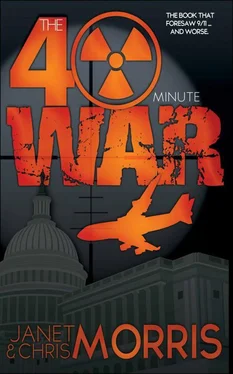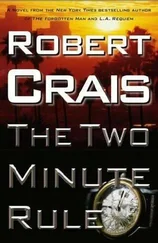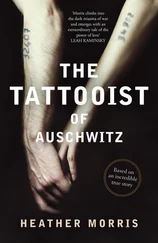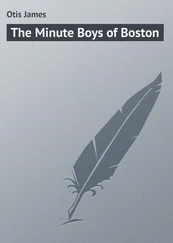“Secretary Beck,” the Japanese trade minister said, “I apologize most sincerely for my boorish comments and my insensitivity of yesterday. We will do all we can to help your people, even though…” Tsutsumi squeezed his eyes shut; his pockmarked cheeks quivered. Then he opened them and said: “I have a confession to make. I had expected to enjoy this, to see your country suffer as it made my country suffer. But revenge is sour when one stands eye to eye with such horror. Accept my apologies and the condolences of my people, please.”
“Accepted and understood, Minister. We’re all a little shaken,” Beck said gently, his mouth on diplomatic autopilot while his mind dwelled on his own problems, of which the little Japanese didn’t then seem a part. “Try to distance yourself from it. It sounds heartless, but it’s all we can do. From now on, you’ll just be overflying sites, not staring casualties in the face. In fact, for most of the rest of your time here, radiation suits will be optional except when directly over red zones: the Black Hawk’s hardened and there’s no reason for you or any of the others to feel apprehensive. It should be easier from here on in, but we had to prove to you we aren’t pulling any punches. If you’d simply take our word for it that we’ve lost both coasts but that the country is by-and-large intact, it would be easier still—on everybody. Have a pleasant evening, Sir.
Walking away, Beck caught Ashmead’s eye and the two of them retired to a corner, drinks in hand, of the officers’ mess. “I have to talk to you, Rafic.”
“Talk.”
There was low music playing, the chatter of men and even a few officers’ wives.
“If we had it to do over again—the interdiction of the Islamic Jihad and their bomb—what would be the last possible moment at which you could have turned things around?”
Ashmead’s brooding eyes measured Beck soberly. Then he said: “Hypothetically? Twenty-two hours before that plane took off from Riyadh, Slick and I were sitting in our hotel room with the team deployed and Elint called in and I had to tell him we’d gotten a pull-back order. Three hours after that we were in our Jetstream on the way to Nicosia. That close enough for you?”
“Rafic, I need numbers—a spread of time, 0600 to 0900, or whatever. That sort of thing.”
“Fuck all, Beck, are you asking what I think you’re asking?”
“Probably. Can you give it to me?”
“Can you tell me if giving it to you is going to do any good, or just end us up digging through hot rubble in Langley?”
“Certainly the latter; as to the former… who the fuck knows? Didn’t Watkins brief you?”
“Not on this, which is a good sign. Okay, let me get my two boys and we’ll see if we can’t get down to hours, minutes, and seconds for you.”
Ashmead turned away to do just that.
“Rafic,” Beck called softly.
Ashmead came back, hands on hips: “Yeah?”
“Tell me it’s not worth the risk and I’ll blow it off. I still can—I’m the only one who can.”
“Why should I tell you that? You’re the walking brain trust. Let’s give it a go.”
Ashmead gave him a thumb’s-up and began col lecting his operations team from the video games in one corner of the officers’ mess.
Four hours later, after the team had left his room and Beck was trying to fall asleep in the stuffy guest room whose air purifier sounded like a Formula-1 car, there was a knock at his door.
In just his briefs, he opened it: he’d been told to sleep fully clothed, but he was still full of grief and resentful, questioning everything, especially whether he wanted to undertake a foray into Langley for CIA, Nye or no Nye, second strike or no second strike.
When he opened it, Ashmead was standing there with Chris Patrick, who was as white as her radiation suit.
“I thought you two ought to have a talk before we split up tomorrow. Unless Chris is coming with us?” Ashmead’s voice was gruff but his eyes were smiling.
“You bastard. All right. Come in, Chris. This is terrible security, Rafic.”
“Tsk, tsk,” said Ashmead as he reached in to pull the door shut after Chris had stepped inside.
“What is it?” she whispered, obviously terrified. “This morning Rafic was going to move heaven and earth to keep me off that diplomatic Black Hawk, now everything’s changed. What’s happening? What do I have to know that he couldn’t tell me and Slick wouldn’t tell me?”
“A number of things. Sit down, please, Chris.” Beck could have strangled Ashmead with his bare hands. He remembered Slick’s warning that when Ashmead wasn’t telling him something, he was telling him something. Beck had no idea how much Ashmead knew of what Nye had told Beck, or what he expected Beck to tell Chris Patrick. But Beck wasn’t going to tell her any more than she needed to know. He didn’t have the heart for it.
“Oh, Christ, don’t give me that State Department voice. You’re scaring me half to death.”
“On the bed, okay?” He sat beside her and slapped a cassette into the tape deck on the nightstand without bothering to see which one it was. “Do you still have your lighter?”
She fumbled in her purse for it with a plucky grin and lit a cigarette before she showed him its green light. “Safe as can be, see?”
“First, I have to explain about the shot that Elint gave both of us in Jerusalem,” he said quietly.
When he’d done that and she finally realized that she’d been given a dose of serum which, augmented by reasonable precautionary measures on her part, would reduce her chances of developing cancer to even less than they had been before the Forty-Minute War, she was overcome with joy, effusive in her gratitude, ready to crawl into his lap: “So we do have a chance—for a normal life, I mean,” she exulted. “You and me. That is, if you’re… if your family… oh, Christ, you know what I mean…”
“A chance, yes.” Then he started to tell her the fable that duty demanded, composed partly of truth and partly of wishful thinking, which he wanted her to disseminate to the dips and to her newspaper—if Nye was right and a second strike was imminent, it was useless disinformation, but it might buy them some time; if Nye was wrong, protecting America by projecting a perception of relative strength was the most important thing he could do right now, surely what Ashmead wanted him to do. “I’m going to begin by explaining that no one actually knows yet what our current state of readiness is or how extensively our war-fighting capability’s been damaged, let alone how long it will take to put America back on track….”
He talked to her for two and a half hours and when he was done he still couldn’t bring himself to tell her about the trip to Langley, so he didn’t, just intimated that tomorrow’s trip was too dangerous for her and that he’d catch up with her and the dignitaries later.
And then he took her to bed. If he was going to sacrifice everything tomorrow on a long shot, he wanted to leave something behind, even if it was only a pleasant memory.
When Slick came to Beck’s room to get Chris it was an hour before sunrise and she was so groggy with sleep that she didn’t have the presence of mind even to tell Beck how much she loved him. She just struggled into her radiation suit and cursed security measures of every sort.
Never mind, she’d have plenty of time to tell him later, now that she was sure that he loved her too. He’d loved her all along, or else he’d never have given her a dose of the precious serum that was earmarked for those crucial to the functioning of the US Government.
In the dimly lit barracks hallway with Slick she was almost euphoric, hardly listening. He had to tell her twice to activate the tracer—“homer,” he called it—that was part of her black chrome watch, so that they could find her if anything went wrong and she got separated from her party, and to re member that if she wanted to contact him, all she had to do was speak into it.
Читать дальше












